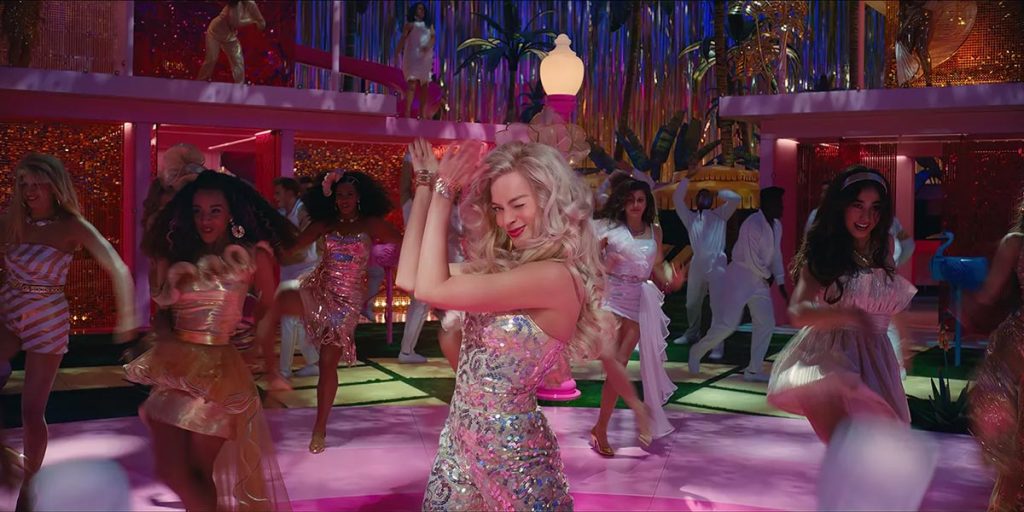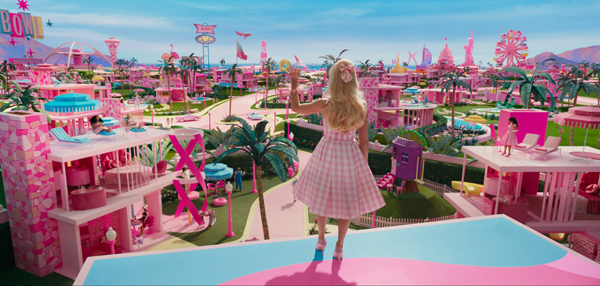
A visually detailed universe of idiosyncrasies, with a human core.
In Barbieland—a world separate from reality and where the actual Barbies and Kens reside—Stereotypical Barbie (the Barbie, played by Margot Robbie) lives a perfect, plastic life that has seemingly no end. Until, she starts questioning her reality and begins deviating from her known, repetitive path. She ventures off into the real world in hopes of “rebooting” and finds out that women don’t rule it, among other things.
Let’s be honest. When a real-action Barbie film was announced, no one was expecting it to be this much of a cultural phenomenon spurring women and men to be decked out in all pink to watch the film. Nor could we have anticipated the first reviews to be anything but overwhelmingly positive. The Barbie movie franchise has always been based on fantasy and idealism typical of any ‘90s Saturday cartoon—regarding it as anything more seemed bonkers.
Yet, Greta Gerwig managed to craft a narrative that goes beyond the plastic veneer of a, well, doll.
But that’s not to say that Barbie is dark or too in touch with reality. In fact, Gerwig leaned into the absurdity of a Barbie utopia. Barbies are always physically on their toes when barefoot (just like the actual dolls), see little need for stairs as they defy gravity by floating down as though placed into position by human hands, shower with imaginary water, drink imaginary liquids, and change clothes (for every occasion) with nary a finger lifted.
Much has been said about the diversity of the extended cast, with naysayers decrying it as part of a woke agenda. Apart from the racial diversity that includes Issa Rae as President Barbie, Alexandra Shipp as Writer Barbie, and Ana Cruz Kayne as Judge Barbie, Barbie portrays other facets of humanity with transgender actress Hari Nef as Dr. Barbie as well as Nicola Coughlan and Sharon Rooney portraying Diplomat Barbie and Lawyer Barbie respectively. There’s even a Barbie in a wheelchair.

What dissenters fail to recognise is that Barbie the doll has always been inclusive. The first Black Barbie debuted in 1980—slightly over a decade after the original Barbie—and a new line of differently sized Barbies were introduced in 2016. And of course, that’s alongside the pretty impressive range of occupations that Barbie has held throughout its 64-year existence.
But back to the story…
The main narrative of Barbie is the Barbie gaining some form of sentience, away from the rest of the Barbies. It's almost like a reverse The Stepford Wives where instead of women being reprogrammed to be submissive robots in a patriarchal community, it's the Barbies who reign all while Kens are side characters that the former care quite little about (when Barbie gets asked where do the Kens stay, she simply says, "I've never thought about it.").
Stepping into the real world causes Barbie to actually experience real human feelings, complete with tears. But most importantly, she finds out that Barbieland's existence did not mean that women in the real world are completely liberated or at the very least, given the same opportunities and treatment as men. Ken too witnesses this and because he constantly feels that his existence is wholly tethered to Barbie, decides to head back to Barbieland and enforce real-world patriarchy. But in the most naive of ways.
The most human element of the film comes in the form of Ruth Handler (played by Rhea Perlman), the co-founder of Mattel and the creator of Barbie. It's not explicitly explained in the film but based on the fact that the film occurs in present-day reality, we can safely assume that it's a spiritual representation of Handler. She guides Barbie in realising that—like the countless other versions of Barbie created after her—there's no predestined ending to her path; Barbie can essentially decide what she wants to be.
If we were to nitpick, there are quite a number of loopholes that aren't exactly explained.
While it Barbieland is aware of the real world, it does seem as though the real world is somewhat aware of the existence of Barbieland too—at least that's what can be gleaned from the rather blasé reactions real-world humans had towards Barbie after she crossed over. The film describes an opening of a rift between the two worlds, but if that were the case, why do the Barbies allude to venturing to the real world as something that happens quite regularly?

The connection between how Barbie dolls are played in the real world and their affect on Barbies in Barbieland too isn't well communicated.
We're introduced to Kate McKinnon's Weird Barbie character that's a manifestation of kids mistreating their Barbies, but does her existence represent the countless number of Barbies constantly made to do the splits or getting their hair butchered? Which also begs the question: Why was Barbie's sudden existential crisis tied to a single person (America Ferrera's character)—are we to believe that no one else in the world were able to project negative thoughts onto Barbie?
There are more of such puzzling inconsistencies but we can always chalk them up to the fantasy nature of the film. Could they have been explained better? Yes.
Robbie and Ryan Gosling are by no means the only A-list faces in the cast. Barbie is quite a star-filled ensemble.
Look out for Dua Lipa as a trio of Mermaid Barbies, John Cena as Merman Ken, Sex Education's Emma Mackey and Connor Swindells as Physicist Barbie and a Mattel intern respectively, as well as Will Ferrell as Mattel's oddball CEO. Oh, there's also Helen Mirren as the film's narrator who cheekily breaks the fourth wall in one scene.
Because the Barbieland universe is incredibly detailed, take note of how everything was perfectly done to actual Barbie-like scale. For example, Barbie is proportionally bigger than her car, and even the items that she uses—hairbrush, carton of milk, etc.—were scaled according to the actual toys.
Finally, there's a scene where Handler shows Barbie what it feels like to be human, and does so through a collage of moments experienced throughout a woman's life. Gerwig called for submissions from the cast and crew of the film for this as a way of adding that personal, human touch. Brilliant.
Barbie is now out in theatres.